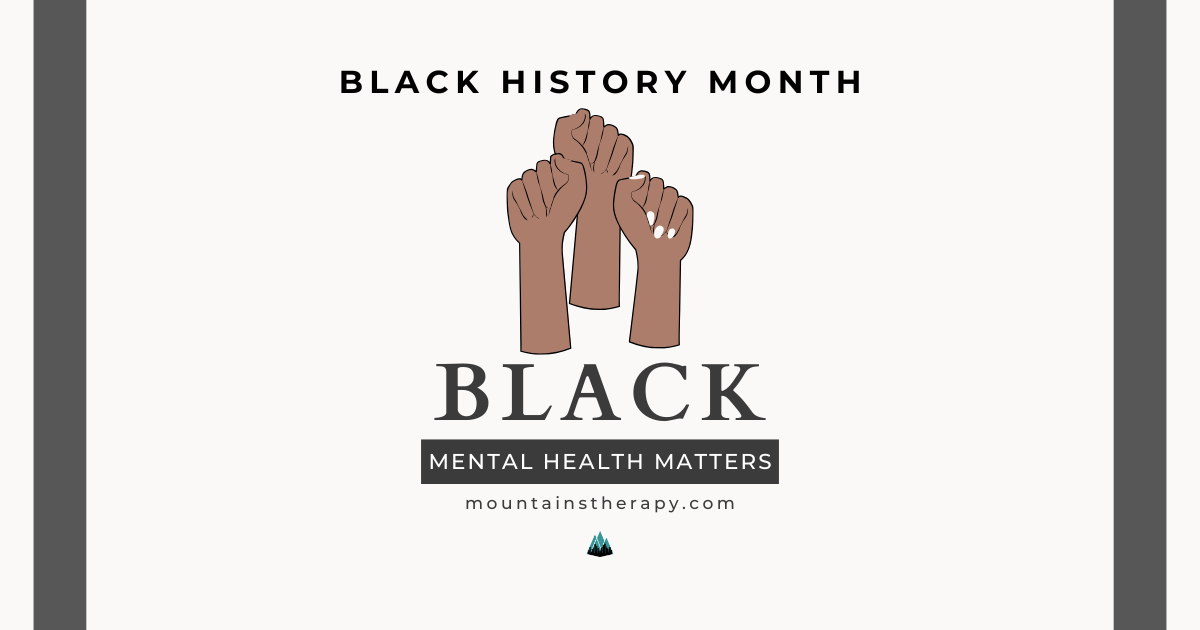Honoring Black History Month: Black mental health matters
Learn more about BIPOC Therapy.
In This Blog, You’ll Learn:
- Why Black History Month is important
- How it started and how it’s celebrated today
- Why Black mental health matters
- Ways you can honor and engage with Black history
Why Black History Month Matters
Black History Month isn’t just about the past—it’s about recognizing the impact of Black history on our present and future. It’s a time to reflect, learn, and celebrate the contributions of Black individuals who have shaped our society in ways that are often overlooked. But it’s also a chance to acknowledge the struggles, resilience, and achievements that continue to define Black culture today.
If you’ve ever wondered, “Why Black History Month?” or “Why is Black history important?”, the answer is simple: Black history is American history. And yet, much of it isn’t taught in schools. What Black history is not taught in school is a conversation we should all be having—because understanding the full story of our past helps us create a better future.
How Did Black History Month Start?
Who started Black History Month? It began with historian Carter G. Woodson in 1926. Originally known as Negro History Week, it was expanded to a month in 1976. But why February? Why is Black History Month in February? Woodson chose this month to honor the birthdays of two key figures—Abraham Lincoln and Frederick Douglass—who played significant roles in Black history.
Since then, every U.S. president has recognized Black History Month, with celebrations spreading to other countries, including Canada and the UK. Which president recognized Black History Month? Gerald Ford officially acknowledged it in 1976, urging Americans to “seize the opportunity to honor the too-often neglected accomplishments of Black Americans.”
How Is Black History Month Celebrated?
There are so many ways to celebrate and engage with Black history, whether individually or as a community. If you’re wondering “How can Black History Month be celebrated?”, here are some ideas:
- Educate yourself and others: Read books by Black authors, watch documentaries, or listen to podcasts that explore Black history and culture.
- Support Black-owned businesses: A simple way to contribute to economic equity.
- Attend local events: Many cities host art exhibits, performances, and lectures during February.
- Have conversations: Talk with friends, family, or colleagues about Black history and its significance.
- Advocate for education: Push for schools to expand their curriculum to include the full scope of Black history.
What Black History Month Means to Me
For many, “What Black History Month means to me” is deeply personal. It’s about pride, identity, and resilience. It’s a reminder of the sacrifices made by those who came before and the work still needed for true equality. It’s also about joy, honoring the rich culture, music, art, and achievements of Black communities.
Black Mental Health Matters
While February is a time of celebration, it can also bring up complex emotions—especially for those who experience racial trauma, systemic injustice, or intergenerational struggles. Black mental health is an essential but often overlooked part of this conversation. Studies show that Black individuals face unique mental health challenges, from generational trauma to the stress of discrimination, yet barriers like stigma, financial limitations, and lack of access to culturally competent care prevent many from seeking support.
If you’ve been wondering, “Where can I find the best therapist near me?” or “Where can I find the best counseling near me?”, finding a therapist who understands these challenges is crucial. Therapy can be a space to heal, unpack generational wounds, and build resilience. The right support can make a difference, whether it's addressing anxiety, depression, or racial identity concerns. At our practice, we prioritize culturally responsive care. If you're looking for the best therapist Montclair, NJ, or seeking the best therapy near me, we’re here to support you with a compassionate, understanding approach tailored to your experiences.
How Therapy Can Help During Black History Month
While February is a time of celebration, it can also bring up complex emotions—especially for those who experience racial trauma, systemic injustice, or intergenerational struggles. Working with the best therapist in Montclair, NJ, or finding the best therapist near me can provide a safe space to explore these feelings. At our therapy practice in Montclair, NJ, NC, FL & UT, we understand the importance of culturally competent care. If you’re looking for the best counseling near me or want to work with a therapist who truly understands your experiences, we’re here to help.
Moving Forward: Beyond Just One Month
Black history isn’t just something we acknowledge for 28 (or 29) days—it’s something we should honor year-round. So if you’ve ever asked, “Will Black History Month still be celebrated?”, the answer is yes. But the real goal is making sure Black history is always recognized, taught, and valued. If you’re looking for support during this month or beyond, working with the best therapist Montclair, NJ can be an important step in your journey. Reach out today to find the right therapist or counselor for you.











